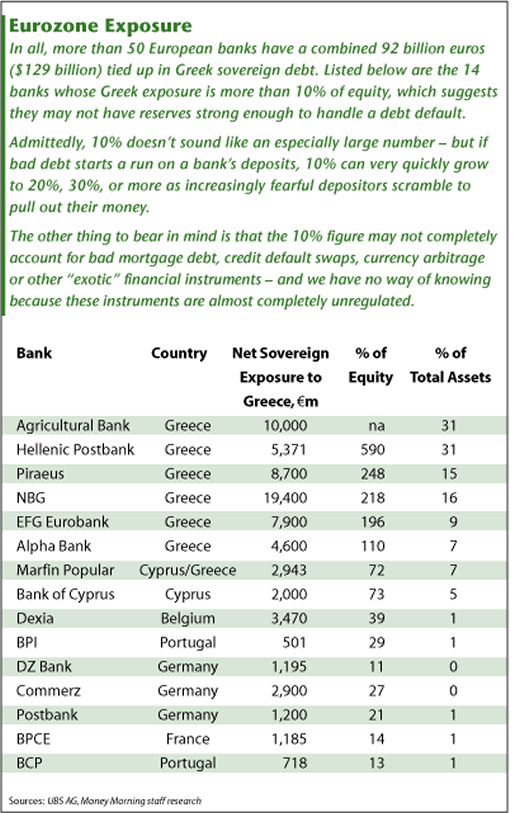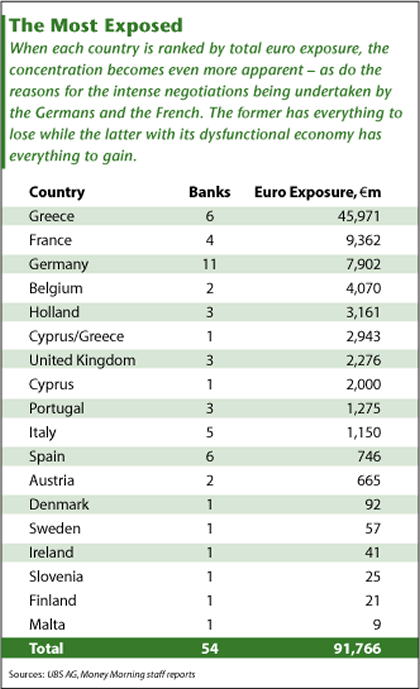The Hunt for Eurozone's Own Lehman Bros That Could Trigger Financial Armageddon
Stock-Markets / Credit Crisis 2011 Jul 13, 2011 - 04:40 AM GMTBy: Money_Morning
 Keith Fitz-Gerald writes:
Does the Eurozone have its own American International Group Inc. (NYSE: AIG), or worse, its own Lehman Bros. when it comes to Greece?
Keith Fitz-Gerald writes:
Does the Eurozone have its own American International Group Inc. (NYSE: AIG), or worse, its own Lehman Bros. when it comes to Greece?
I believe it does.
Why else would the European Union have bent over backwards to "save" a member nation that: A) Accounts for 2.01% of the EU by trade volume; and B) Would essentially be like letting Montana go out of business - no offense to Montanans or Montana!
More to the point, if things really were under control, why would European Central Bank President Jean-Claude Trichet say that risk signals for financial stability in the euro area are flashing "red" as he did following a meeting of the European Systemic Risk Board in Frankfurt?
The short answer: Because he knows what the European banks are desperately trying to hide from the rest of the world - that there are still enormous risks and they're even more concentrated now than they were in 2008 at the start of the financial crisis.
In all, more than 50 European banks have a combined 92 billion euros ($129 billion) tied up in Greek sovereign debt. Worse, there are 14 banks whose Greek exposure is more than 10%, which suggests that they may not have reserves strong enough to handle a debt default.
Admittedly, 10% doesn't sound like an especially large number - but if bad debt starts a run on a bank's deposits, 10% can very quickly grow to 20%, 30%, or more as increasingly fearful depositors scramble to pull out their money.
The other thing to bear in mind is that the 10% figure may not completely account for bad mortgage debt, credit default swaps, currency arbitrage or other "exotic" financial instruments (and we have no way of knowing because these instruments are almost completely unregulated).

When countries are ranked by total exposure to the euro, the concentration becomes even more apparent - as do the reasons for the intense negotiations being undertaken by the Germans and the French. The former has everything to lose while the latter, with its dysfunctional economy, has everything to gain.
Incidentally, when ranked by the number of banks at risk, the reasons why I repeatedly warned that credit-default-swap raiders are going to go after Spain, Italy, and France when they're done with Greece, Ireland, and Portugal becomes abundantly clear: The concentration of risk is a target-rich environment for major trading houses that have grown so powerful they can attack entire countries, much the way the bond vigilantes attacked debt in the 1990s as a means of raising rates.
What's ironic is that the very bailout policies everybody thinks are helping are, in fact, providing the incentive to attack because the traders know they can't lose if they apply enough leverage.

What the ECB President Knows that You Don't
Now let's chat for a minute about what else I think Trichet has figured out - namely that the risks to U.S. financial institutions are significant and that these same risks may actually outweigh the costs of the last global bailout should Greece fail.
I believe that Trichet has very quietly communicated this information to U.S. Federal Reserve Chairman Ben S. Bernanke, who looks and sounds defeated and who appears to be telegraphing one or more black swans on the horizon - even as he publicly downplays the possibility.
At the same time, regulators who have probably not been explicitly told what's at stake are wising up, which is why they've been "probing" U.S. financial institutions with regard to direct and indirect Greek exposure - especially when it comes to details on the credit default swaps they may have written on Greece, Greek debt, and European banks.
Good!
There are two particular areas of concern as I see them: The Fed's dollar swap lines and money market funds.
Dollar swap lines are specific credit lines extended by the Fed as a means of ensuring that stressed foreign banks have easy, quick access to short-term U.S. dollar-denominated funds when they need to take "risk off" or as part of the well-documented "flight to safety."
First, I want to know what the Fed's dollar swap lines are with European central banks, and which U.S. banks have engaged in similar arrangements and are using their swaps to daisy chain the capital into other "investments" that directly or indirectly involve Greek exposure.
And secondly, I want to know which banks have money market exposure to Greek debt. Not many investors realize this, but money market funds have long invested in foreign debt instruments as a means of maintaining their value and their stability. This is not an inconsequential matter, either.
According to a report from Fitch Ratings Inc., the 10 largest U.S. prime money market funds represent more than $755 billion of assets - over half of which are directly exposed to European banks and presumably to the Greek debt crisis. That's another $377.5 billion in exposure our system may not be able to handle.
Throw in private liquidity pools, the rest of the U.S. money market universe, and European money market funds denominated in dollars, and you could easily hit another $2 trillion to $5 trillion in risks that are not yet factored into the financial system -- probably more.
But you know what?
As problematic as that sounds, I am actually more worried about something we've heard with increasing frequency over the past few weeks - that the Fed and Wall Street are both optimistic that they understand the risks involved.
Anybody besides me want to call BS?
I think we should, because the mere fact that they think they "understand" the risks involved practically guarantees that they don't. And really, we have the right to know if there's another Lehman Bros. lurking somewhere in the Eurozone.
Source :http://moneymorning.com/2011/07/13/does-the-eurozone-have-its-own-lehman-bros/
Money Morning/The Money Map Report
©2011 Monument Street Publishing. All Rights Reserved. Protected by copyright laws of the United States and international treaties. Any reproduction, copying, or redistribution (electronic or otherwise, including on the world wide web), of content from this website, in whole or in part, is strictly prohibited without the express written permission of Monument Street Publishing. 105 West Monument Street, Baltimore MD 21201, Email: customerservice@moneymorning.com
Disclaimer: Nothing published by Money Morning should be considered personalized investment advice. Although our employees may answer your general customer service questions, they are not licensed under securities laws to address your particular investment situation. No communication by our employees to you should be deemed as personalized investent advice. We expressly forbid our writers from having a financial interest in any security recommended to our readers. All of our employees and agents must wait 24 hours after on-line publication, or 72 hours after the mailing of printed-only publication prior to following an initial recommendation. Any investments recommended by Money Morning should be made only after consulting with your investment advisor and only after reviewing the prospectus or financial statements of the company.
Money Morning Archive |
© 2005-2022 http://www.MarketOracle.co.uk - The Market Oracle is a FREE Daily Financial Markets Analysis & Forecasting online publication.



